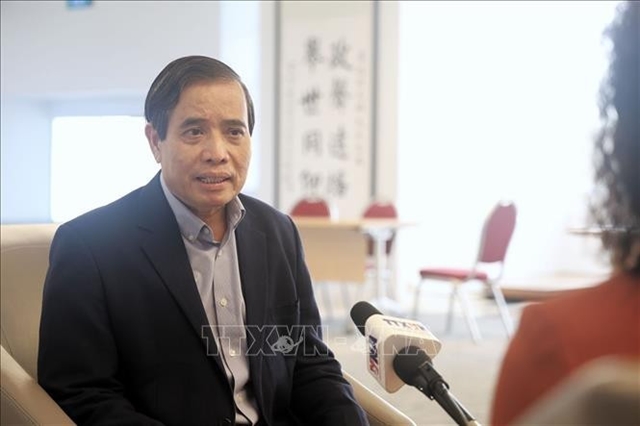 Society
Society


|
| Prof. Vũ Minh Khương from the Lee Kuan Yew School of Public Policy in Singapore VNA/VNS Photo |
HÀ NỘI – Politburo’s Resolution No. 66-NQ/TW on the reform of law making and enforcement processes can enable Việt Nam to “advance very far, very strongly” in the years ahead, said Prof. Vũ Minh Khương from the Lee Kuan Yew School of Public Policy in Singapore.
Speaking to Vietnam News Agency correspondents in Singapore, Khương said that institutional reform is clearly a strategic lever, reflected in three key dimensions.
First, Việt Nam has already passed through the phase of “removing barriers” and “unlocking constraints.” The country must now shift from liberating resources to elevating the nation's stature through comprehensive reform.
Second, today’s technological revolution, particularly artificial intelligence (AI) and digital innovation, presents unprecedented opportunities for rapid progress, provided that institutions create a solid foundation for Việt Nam to seize them.
Third, amidst the world's complex geopolitics, weak institutions risk leaving Việt Nam vulnerable to external shocks and conflicts. Therefore, he argued, institutional reform is very important, and that Việt Nam has great potential to reform its institutions and meet the era's needs.
Addressing the main obstacles to legal reform, Professor Khương emphasised that Việt Nam must adopt a truly scientific, modern, and comprehensive approach.
From his comparative research on institutional reform worldwide, he highlighted three guiding principles, which he called the “three Hs.” The first is Heart, ensuring reforms serve the interests of citizens and businesses. The second is Head, meaning vision - knowing what to do to break through to generate rapid growth. The third is Hand, meaning action - turning commitments into real, measurable outcomes.
Together, he said, these principles can create long-lasting and sustainable momentum for Việt Nam’s development.
The scholar also shared international experience that Việt Nam could learn from. Singapore, the Republic of Korea, and China have leveraged AI and digital technology to accelerate reforms, with tangible results.
Việt Nam could leverage AI to evaluate its laws and policies on a scale of one to five, where one represents very weak and five signifies excellent. The assessment would be based on criteria such as simplicity, clarity, ease of implementation, practical benefits for citizens, public participation, and the level of trust citizens have in the system. The results could then be compared to policies of other countries to identify opportunities for improvement.
Citing Shanghai as an example, Professor Khương observed that the city has developed an advanced, people-centred smart governance model that is both efficient and widely supported.
He said that Việt Nam should strive for reforms that deliver not only economic and social benefits but also instill a sense of national pride. — VNS




